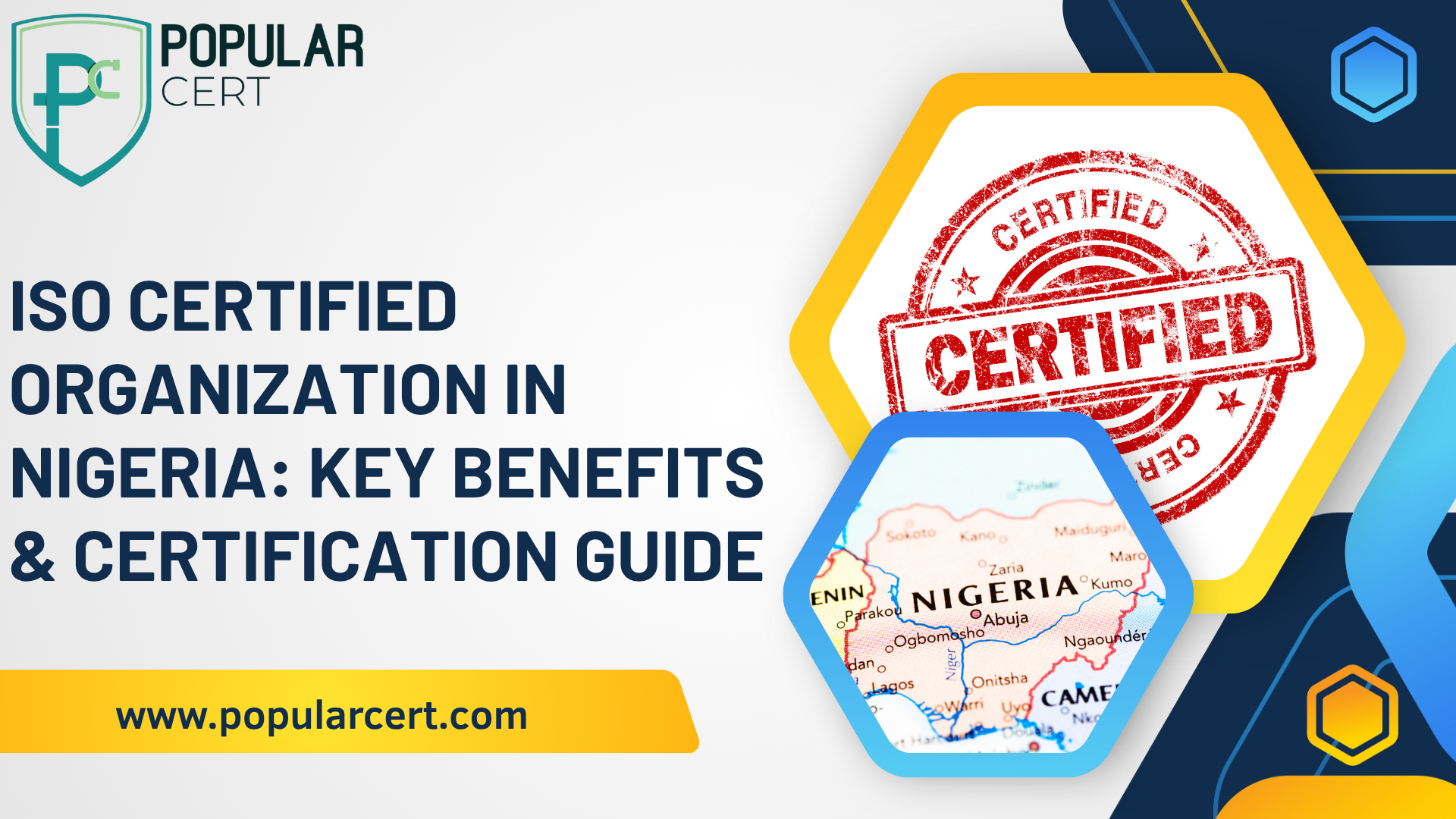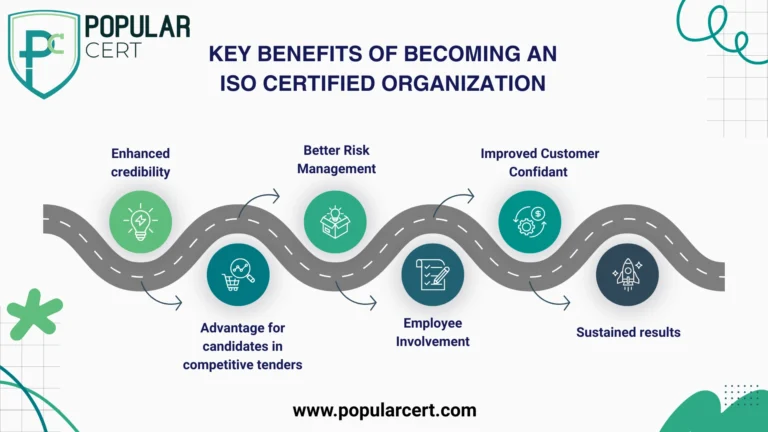ISO Certified Organization in Nigeria: Key Benefits & Certification Guide

Introduction
In the competitive business environment of today, being recognized as an ISO certified organization is more than just an achievement—it’s a prerequisite in doing business. For Nigerian companies, ISO certification in Nigeria enhances credibility, provides access to new markets, improves customer trust, and mitigates risks of non-compliance with international standards.
From small businesses aiming to establish a market reputation to large corporations seeking access to international markets, ISO certification provides a framework to operate with enhanced efficiency and market competitiveness.
This guide will look into what being an ISO certified organization entails, the benefits, the certification process in Nigeria, and the role of Popularcert in aiding businesses to attain this prestigious certification.
What Does It Mean to Be an ISO Certified Organization?
An ISO certified organization is a business which has one or more of its management systems subjected to an external audit and certified by an external auditor, used an accepted international standard, and a recognized certification body to ISO standards.
The International Organization for Standardization (ISO) develops international standards to cover the most important business functions as quality and safety, environmental responsibility and information security.
In Nigeria, some of the most adopted ISO standards are:
- ISO 9001 – Quality Management Systems
- ISO 14001 – Environmental Management Systems
- ISO 45001 – Occupational Health & Safety Management Systems
- ISO 22000 – Food Safety Management Systems
- ISO 27001 – Information Security Management Systems
These ISO standards are crucialmente adopted in Nigeria. Being ISO certified garantices practicing internationally recognized policies and procedures, and guarantees the compliance of quality,moreover, efficiency and reliability.
Why ISO Certification Matters for Nigerian Businesses
- Global Acknowledgment & Access to the Market
ISO certification opens gateways to international markets. A lot of international clients and partners prefer to do business with certified suppliers, most especially in the oil & gas, manufacturing, and food processing industries. With certification, confidence and expectation are guaranteed, and compliance is almost guaranteed.
- Enhanced Operational Efficiency
With ISO standards, businesses undergo restructuring of their operations, leading to the reduction of waste and implementation of orderly processes. This results in increased productivity, reduction of errors, and refined resource consumption.
- Regulation Compliance
In Nigeria, most sectors operate within defined mandates. The use of certifiable standards for the stated businesses guarantees compliance and consistent business operations while lowering compliance challenges on imposed fines.
- Customer Confidence & Trust
ISO certification acts as a seal of quality and reliability. Trust customers when your products or services delivery are of high value. More often than not, Iso certification will boost your customer retention and encourage more customer referrals.
Key Benefits of Becoming an ISO Certified Organization
Types Of Certification
- ISO Certification
- ISO 9001 Certification
- ISO 14001 Certification
- ISO 45001 Certification
- ISO 22000 Certification
- ISO 27001 Certification
- ISO 17025 Certification
- ISO 13485 Certification
- ISO 20000-1 Certification
- ISO 22301 Certification
- ISO 50001 Certification
- ISO 37001 Certification
- IATF 16949 Certification
- ISO 29001 Certification
- ISO 31000 Certification
- ISO 20121 Certification
- ISO 10002 Certification
- ISO 41001 Certification
Get Free Consultation
Our Clients



















- Enhanced credibility – Grows credibility and mark of trust in any country.
- Better Risk Management – Enhanced methods make it possible to find, analyze, and reduce risks.
- Improved Customer Confidant – Assurance procedures result in reduced dissatisfaction and improves customer retention and loyalty.
- Advantage for candidates in competitive tenders – Many tenders from the public and large organizations demand for ISO certifications.
- Employee Involvement – Documented procedures motivates the employees and improves the average morale for the workforce.
- Sustained results – Set targets with ISO frameworks which will aid the organization in achieving adaptability for whatever the situational changes are.
The ISO Certification Process in Nigeria
To achieve an ISO certification, there are specific steps an organization needs to follow.
Step 1 – Gap analysis
Evaluate your processes to the prerequisites of the gap and recognition standard to identify the is and the where improvements are needed to the processes.
Step 2 – Implementation
In this phase, you execute the required changes, which include updating documentation, training personnel, and ensuring that processes conform to the operation’s requirements.
Step 3 – Internal Audit
An internal audit verifies all processes are completed per the ISO standard. This phase is useful for resolving nonconformities that would otherwise be identified during the official certification audit.
Step 4 – Certification Audit
A certification body performs a two-stage audit, which comprises the following:
Stage 1: Document Review and Readiness Check.
Stage 2: Assessment of Processes and Practices on Site.
Step 5 – Maintaining Certification
Like all ISO standards, certification is not the end. This activity adds value to the business, but regular compliance and continuous improvement processes need to be in place, through targeted surveillance audits.
Choosing the Right ISO Standard for Your Organization
Your business and customer needs drives which standard to pursue, as not all ISO standards are the same.
- ISO 9001: For organizations aiming for enhancement and greater value in the quality of the products/services offered and streamlined operations.
- ISO 14001: For organizations which prioritize environmental responsibility, sustainability, and stewardship.
- ISO 45001: For organizations and employers which need to increase workplace safety and risk mitigation.
- ISO 22000: For producers and suppliers of food products who are committed to food safety.
- ISO 27001: For organizations that deal with sensitive data and wish to fortify their information security.
Tips: Engage with Popularcert to streamline the process and determine the applicable standard(s) for your organization.
How Popularcert Helps Nigerian Businesses Get ISO Certified
The process of obtaining ISO certifications can be made easier and less daunting if you partner with a trusted consulting firm. Popularcert provides comprehensive ISO certification consultancy services designed for the Nigerian business environment.
Why Popularcert?
- Receive hands-on assistance for guaranteed certification all the way from gap analysis with Popularcert’s consistent expert support.
- Get addressed with your sector’s particular hurdles with customized strategies.
- Receive thorough assistance with manuals and procedures alongside employee training.
- Enjoy proven successful certifications across myriad industries within Nigeria.
- Gain access to support with meeting the compliance requirements post certification.
- Build a robust culture of excellence alongside receiving certification.
In today’s hyper-competitive Nigeria business landscape, ISO certification provides immense value as it increases your operational prowess, strengthens your market credibility, and expands business avenues.
Conclusion – Take the Next Step Toward ISO Certification
ISO certification in Nigeria is not an optional credential, in fact, an entire market it is a strategic asset. Obtaining an ISO certification increases credibility, operational efficiency, market access, and overall, expands business prospects.
No matter the business objective, be it improving quality, safety, environment, or information systems, Popularcert has appropriate ISO standards tailored to the needs of the business.
Popularcert guarantees a structured, efficient, and successful path to a business becoming ISO certified.
Reach out to Popularcert now to begin the ISO certification process and leverage opportunities to grow your business internationally.
GET A FREE CONSULTATION NOW
FAQs
An ISO certified organization’s meaning, what does it denote?
It’s a company that has established and sustained a management system aligned with international standards ISO, verified by a certification body.
How long does ISO certification take in Nigeria, how long does it take?
It varies based on the organization’s processes, selection of ISO standards, and the existing process readiness. With some expert guidance, it will be faster and more streamlined.
What ISO standard would be more useful for my business?
It relies on the industry and business objectives. While ISO 9001 remains the most commonly adopted, ISO 14001, ISO 45001, ISO 22000 and ISO 27001 may sometimes be more suited to your requirements.
Am I obliged to renew my ISO certification?
Of course. ISO certifications come with a period of surveillance audits, and full recertification is typically required every three years.
Is it possible for small businesses to obtain ISO certification?
Of course. ISO standards are built to be relevant for all businesses, including small and medium-sized enterprises.
